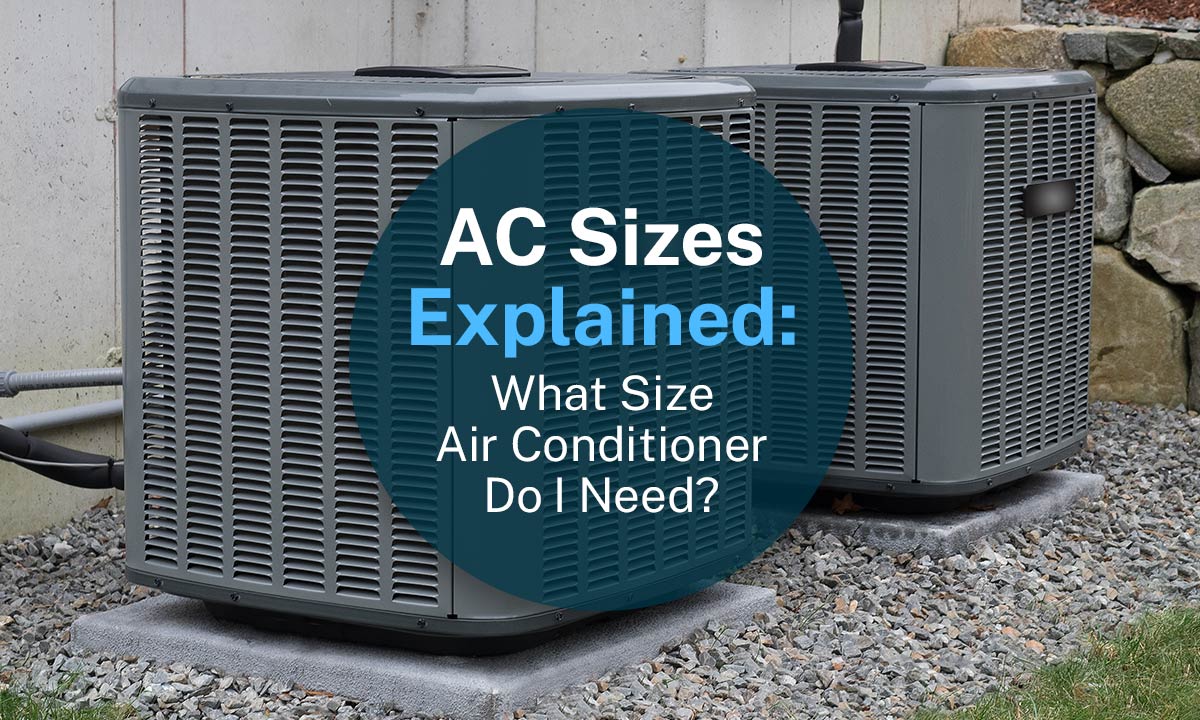What size air conditioner do I need? You’ve decided that you’d like to invest in installing air conditioning in your house or apartment – now what?
There are a few different things you should consider once you’ve decided to go ahead with getting air conditioning, but one of the most important factors is figuring out exactly what kind – and what size – of air conditioner is best suited to the area you’re looking to cool.
The obvious factor to consider when deciding on the size of your air conditioner is to think about the size of the room you’ll be using it in.
However, there are a number of other things that will impact the size of the unit, too.
Here, we’ve put together a guide to help you understand the air conditioning capacity you’ll need to effectively cool a room or house.
We’ve also broken down all of the factors that will play a contributing part in determining the size of air conditioner that’s best for you.
How is an air conditioner’s capacity is measured?
Air conditioning units have their cooling capacity measured in kilowatts (kW).
When buying a unit its cooling capacity should be very prominent – it’s usually in the model name of the unit.
The air conditioners capacity is crucial in determining whether or not the air conditioner you have selected will be large enough to effectively cool the area you have selected.
How to predict the air conditioning capacity you need for your room
Calculating the amount of cooling capacity your air conditioner needs to satisfactorily cool space can be complicated, however, there is a general rule of thumb to figure out approximately how many kW will be required to cool a room.
To calculate the size of the air conditioner needed, you’ll need to start by working out the size of the room in square metres.
You can do this by multiplying the width of the room by the length in metres. Considering Maryland’s extreme weather conditions, households will normally require 150-180 watts of power per square metre.
Keep in mind that there are 1000 watts in a kilowatt (kW).
In mathematical terms, the equation to work out how much power you’ll need looks like the below: [(square metres of the room) x 170 (average wattage)] ÷ 1000 (to convert into kW) = the minimum size of unit your room requires.
We’ve also put together the below guide to help you understand the amount of kW a unit will need to successfully cool average room sizes.
Of course, you can always opt for a larger size than our guide below. However, a larger unit will likely use more electricity and lead to higher power bills.
On the other hand, if you go for an AC unit that’s a smaller size than the below recommendations, it’s likely the unit won’t have enough power to adequately cool the room.
If the air conditioner isn’t large enough it will force itself to constantly work to attempt to meet the desired temperature.
This can result in excessive electricity bills and a shorter lifespan for your unit.
Small room
- A room 10m2 – 20m2 will require a 2.5kW unit to cool the room.
Medium room
- A room 20m2 to 30m2 will require a 3.5kW unit to cool the room.
Large room
- A room 30m2 to 45m2 will require a 5-6kW unit to cool the room.
Extra-large room
- A room 45m2 – 65m2 will require a 7-8kW unit to cool the room.
Other factors affecting the size of the air conditioning required
Aside from room size the other big factor that determines how much cooling capacity is required, and hence determines the size and type of air conditioner you need, is the heat load in the room.
Heat loads can come from either external or internal sources.
Is the roof/ceiling insulated
Aside from the room size, insulation has one of the biggest effects on what size air conditioning unit will be required to adequately cool your room.
Insulation is, quite literally, the foundation of maintaining stable temperatures in a room.
Insulation works as a temperature barrier – stopping the transfer of heat in or out of a room.
For spaces with an uninsulated roof/ceiling, an air conditioner will have to work much harder to cool a space, which usually means a bigger unit will be required.
Areas that don’t have ceilings/roofs that are exposed to the sun, like the ground floor of a two-storey house or an apartment that isn’t on the top floor of a house, typically have lower heat loads than those which are.
The Geographic Location
The climate in your geographical location will drastically affect how strong your unit will need to be.
As you’d expect, a hotter area, or an area with high humidity, will require higher cooling capacity than a cold area with low humidity.
Air conditioners work to lower the temperature of a room and remove humidity. Some areas in Maryland experience tropical climates that are high in both humidity and temperature.
So, an area like this will obviously pose a lot more work to an air conditioner to counteract external temperatures in comparison to low humidity, cold area, and more wattage will be required.
The orientation of the room
The layout of your room or house can play a big part in how hot the area gets which can result in determining the amount of wattage needed from an air conditioner to adequately cool the room.
A house or room that faces the sun directly for the majority of the day will heat up a lot quicker than areas that are protected from the sun.
If the area you’re looking to cool has a lot of windows that face the sunlight directly, a higher capacity air conditioner may be required.
A large north or west-facing room with big windows will let more heat in than a southern-facing room with fewer or smaller windows.
The height of your ceiling
The basic formula to calculate the size of an air conditioning unit required doesn’t actually take into account the height of the room -it assumes that all rooms are an average height of 2.4m.
This is fine if your room actually is this height – but if you have high ceilings or a loft area, then the calculation may be underestimating the amount of wattage you’ll need to cool your room.
Types of rooms or areas with high ceilings, a loft area or – especially – a large open plan area that connects to a second story will require more powerful AC units.
These types of areas can be tricky to determine what capacity air conditioner is required.
So, if you’re looking to cool an area like this we would recommend enlisting the help of one of our air conditioning estimators.
An estimator will be able to determine the size and heat load of the area and suggest the appropriate size unit or units.
The appliances that are used in the room
If the area being cooled is a normal, residential space then the appliances in the room shouldn’t affect the capacity of air conditioning required too much.
Even a residential kitchen with a full-sized fridge and other cooking appliances will require the same strength as a room with no appliances.
However, if you’re planning to install air conditioning to cool a space with many appliances – like a commercial kitchen, then the appliances create heat and as such a higher capacity air conditioner will be required when compared to a residential area of the same size.
For these types of areas, it’s best to have an air conditioning estimator undertake an inspection and recommend the best type of system or unit for the given space.
Rooms with large numbers of computers/servers in them typically have extremely high heat loads per square meter.
The number of people using the room
People generate heat, so when there are a large number of people in a room, it will be much hotter than a similar sized room with no-one in it.
Rooms that typically have very high heat loads per square meter due to high people density are auditoriums and meeting rooms.
So when determing the size of the air conditioner required for rooms like these assumptions must be made about the maximum and normal number of people who will use the room.
The type of AC system
For this guide, we have focused on the capacity of the air conditioners. However, there are a range of different style of systems.
Some common examples of popular air conditioning systems include portable air conditioners, window air conditioners, split system air conditioners and ducted air conditioners.
Each style of air conditioner has pro’s and con’s – but not all air conditioners are suitable for all situations.
Ready for a quote?
If you’re interested in installing an air conditioning system in Oxon Hill, MD, fixing your current one or would just like some more information about your options, get in touch with our friendly team for a quote or to schedule a site inspection.








0 Comments